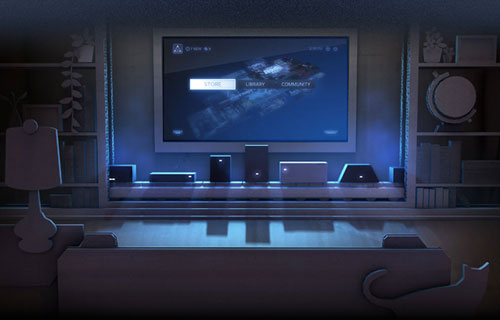
Valve Software will later this year beta test 300 hardware boxes running its Linux-based SteamOS, a standalone operating system for entertainment appliances in consumers’ living rooms.
The prototype box for the Steam platform, which is optimized for gaming in the living room, is completely upgradable and open.

Beta testers are encouraged to hack or mod the box.
This “will mean that there are lot more games … coming to Linux,” said Jordan Cwang, managing editor and cohost of Linux Gamecast Weekly.
“The [Linux] market is damn ripe for exploitation,” Cwang told LinuxInsider. “The next-generation consoles are essentially locked-down personal computers, so when Valve releases an open console based on commodity hardware that anyone can make for the same price or less, we’re going to see a rise in interest for PC — especially Linux — gaming.”
Steam “likes to dream really big, and they’re disruptive in the sense Google likes to be disruptive,” remarked Lewis Ward, a research manager at IDC.
More on Steam Boxes
Valve is working with multiple OEMs to bring “a variety of Steam gaming machines to market” during 2014, all running the Steam OS.
The machine being tested is aimed at users who want maximum control over their hardware. Other boxes will optimize for size, price, quietness or other factors.
All the nearly 3,000 games on Steam will be available during the beta. Hundreds of them already run natively on the SteamOS, and the rest will work seamlessly through in-home streaming, Valve said.
Testers can submit feedback as bug reports, forum posts, concept art, 3D printers, haikus and publicly stated opinions, to the Steam Universe Group.
“This is the first step in a really long process of trying to create a new game platform for the living room that is going to please hardcore gamers and be driven primarily from their perspective,” IDC’s Ward told LinuxInsider.
The Wisdom Of The (Gaming) Crowd
“Valve starts with the gamers and lets them tell it what’s good or not, and then incorporates what’s good for the company,” commented IDC’s Ward. “The console OEMs, who have a much larger managerial infrastructure, are going to put their own profits first and gamers second.”
Overall, Linux “tends to be more developer-driven, so it’ll be interesting to see how Steam’s strategy plays out,” Charles King, principal analyst at Pund-IT www.pund-it.com, told LinuxInsider.
“It does serve [Valve’s] interest that [SteamOS] is a free and open source OS that can be picked up by any OEM, and they’re basically piggy-backing on top of Android,” IDC’s Ward said.
“They have the potential over time to succeed, as long as they have great hardware, tied to great software, and a great gaming environment, despite the disadvantages of being so late to market and taking on the entrenched companies,” Ward concluded.
Giving Linux a Boost
Linux gaming has been marginalized by game vendors, largely because it “had a pretty bad rap in the early days,” said Linux Gamecast Weekly’s Cwang. “You needed to actually know what you were doing to get the system up and in a workable condition.”
There have been some attempts to offer games for the Linux platform, including Loki Software porting Windows games over, and the open source gaming scene is alive and well, but “without big name games on the platforms, no one is really going to bat an eye at it,” Cwang pointed out.
Loki declared Chapter 11 bankruptcy in 2001.
“I think with SteamOS and the looming Steam Box, this is going to change in the next few years,” Cwang continued.
The impact of Valve’s announcement has already been felt — AMD and Nvidia have reportedly improved their driver support for Linux.
Nvidia has been criticized openly by Linux founder Linux Torvalds, but on Monday, it reached out to the Noveau project, which builds free drivers for the company’s graphics cards.




















































